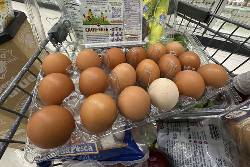The Trump administration is suing the state of California to block animal welfare laws that it says unconstitutionally helped send egg prices soaring. But a group that spearheaded the requirements pushed back, blaming bird flu for the hit to consumers' pocketbooks.
The lawsuit, filed in federal court in California on Wednesday, challenges voter initiatives that passed in 2018 and 2008. They require that all eggs sold in California come from cage-free hens.
The Trump administration says the law imposes burdensome red tape on the production of eggs and egg products across the country because of the state's outsize role in the national economy.
“It is one thing if California passes laws that affects its own State, it is another when those laws affect other States in violation of the U.S. Constitution,” U.S. Agriculture Brooke Rollins said in a statement Thursday. "Thankfully, President Trump is standing up against this overreach.”
Egg prices soared last year and earlier this year due in large part to bird flu, which has forced producers to destroy nearly 175 million birds since early 2022. But prices have come down sharply recently. While the Trump administration claims credit for that, seasonal factors are also important. Avian influenza, which is spread by wild birds, tends to spike during the spring and fall migrations and drop in summer.
“Pointing fingers won’t change the fact that it is the President’s economic policies that have been destructive," the California Department of Justice said in a statement Friday. "We’ll see him in court.”
The average national price for a dozen Grade A eggs declined to $5.12 in April and $4.55 in May after reaching a record $6.23 in March, according to the U.S. Bureau of Labor Statistics. But the May price was still 68.5% higher than a year earlier.
“Trump’s back to his favorite hobby: blaming California for literally everything,” Gov. Gavin Newsom's office said in a social media post.
The federal complaint alleges that California contributed to the rise in egg prices with regulations that forced farmers across the country to adopt more expensive production practices. The lawsuit also asserts that it is the federal government's legal prerogative to regulate egg production. So it seeks to permanently block enforcement of the California regulations that flowed from the two ballot measures.
“Americans across the country have suffered the consequences of liberal policies causing massive inflation for everyday items like eggs,” Attorney General Pam Bondi said in a statement. “Under President Trump’s leadership, we will use the full extent of federal law to ensure that American families are free from oppressive regulatory burdens and restore American prosperity.”
While 2018's Proposition 12 also banned the sale of pork and veal in California from animals raised in cages that don’t meet minimum size requirements, the lawsuit only focuses on the state's egg rules.
Humane World for Animals, which was named the Humane Society of the United States when it spearheaded the passage of Proposition 12, says avian influenza and other factors drove up egg prices, not animal welfare laws. And it says much of the U.S. egg industry went cage-free anyway because of demand from consumers who don't want eggs from hens confined to tiny spaces.
“California has prohibited the sale of cruelly produced eggs for more than a decade — law that has been upheld by courts at every level, including the Supreme Court. Blaming 2025 egg prices on these established animal welfare standards shows that this case is about pure politics, not constitutional law,” Sara Amundson, president of the Humane World Action Fund, said in a statement.
The American Egg Board, which represents the industry, said Friday that it will monitor the progress of the lawsuit while continuing to comply with California’s laws, and that it appreciates Rollins’ efforts to support farmers in their fight against bird flu and to stabilize the egg supply.
“Egg farmers have been both responsive and responsible in meeting changing demand for cage-free eggs, while supporting all types of egg production, and continuing to provide options in the egg case for consumers,” the board said in a statement.
...


 Copyright © 1996 - 2025 CoreComm Internet Services, Inc. All Rights Reserved. | View our
Copyright © 1996 - 2025 CoreComm Internet Services, Inc. All Rights Reserved. | View our